First, a little business. It’s been over a year since I started asking folks to pay, if they were able, to support my writing here. I want to do my annual thank you gifts (in the long tradition of…one year), so if you are a paid subscriber, and you’d like an art surprise in the mail, just message me your mailing address and off they will shortly go.
Also, thanks to everyone bearing with me in these long gaps without much writing. This has been a hard and tumultuous year, and it means an awful lot to me that you continue to support me even when I’m not being particularly productive.
I’ve been looking through some photo albums from the 70s and 80s lately. It was an era of democratizing access to cameras and related technology, and not yet the era when you could be sure you were taking a good picture. You could just aim, and then one of the little flash bulbs in the camera-mounted bar of them, like a little carton of eggs, would explode and then you’d wait and hope for the best. I think most of the misfires just got thrown away after development, but some ended up in albums. I looked at one the other day that was mostly an expanse of brown shag carpet, from floor level, as if a crawling GI Joe had been reconning the living room. In the blurry distance was part of a Christmas tree. Why keep this frame? Who put it in this album?
I have teenagers, and I teach mostly young adults, and I also like to read about such people. Their culture embraces the bad and slow. They like old photo booths, and disposable cameras, and on-purpose-ugly haircuts and clothes. This is neither with the Gen Xer’s ironic detachment, nor the Millenial’s earnest self-involvement. It’s some other thing—a capacity for joy and amusement coexisting with the knowledge that things are very bad, and none of it is their fault, and also life is fun and funny. I love them for all of this. They are engaged in a sort of anti-curation project of recovering an analog innocence that they never lived through and that they feel nostalgia for. They like thinking about a time when we, their parents, would try to take good photos, but mostly did not, and we didn’t find out until much later when the photos were developed and it was too late to do any of it over. It’s liberating.
I have lots of photos in my modern camera roll that look bad. They look like accidents. They look like when you accidentally take a picture while holding your phone near your leg. They look like bad photos from the 80s but in modern camera phone quality. They’re often of ugly stuff. A lot are of blank walls, or pavement cracks, the landings of staircases in municipal buildings. Rarely any people, hardly any selfies. No pets, and not really any animals, except insects in extreme close-up. A lot of forgotten places—empty lots, ditches, roadsides—that my plant field guides refer to as “waste spaces.” Partly I take pictures of places like this because I get strong longings to go hide in them. They’re usually ignored, rarely frequented, and convey a kind of blankness of purpose that registers to my perpetually overtaxed nervous system as rest.
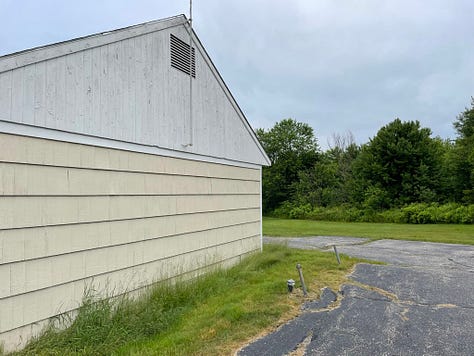

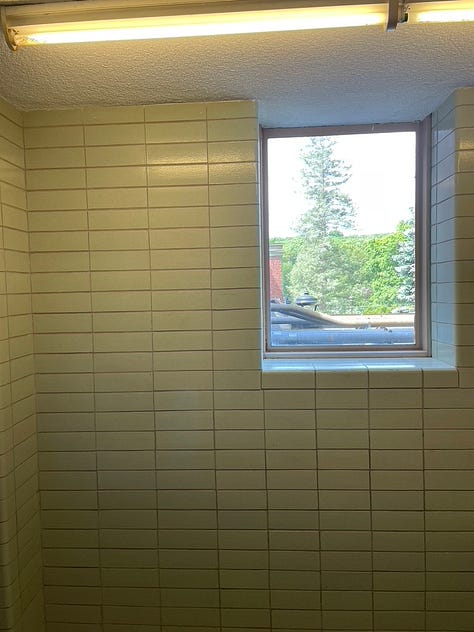
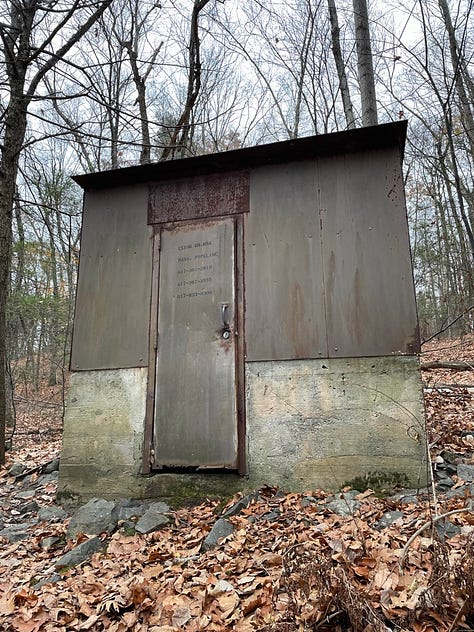
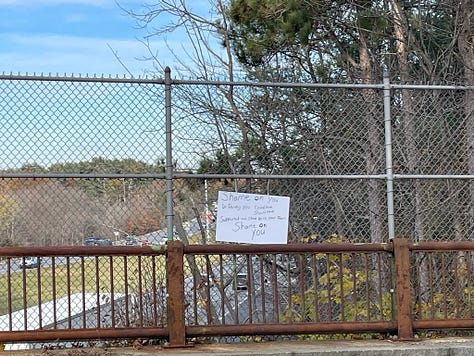

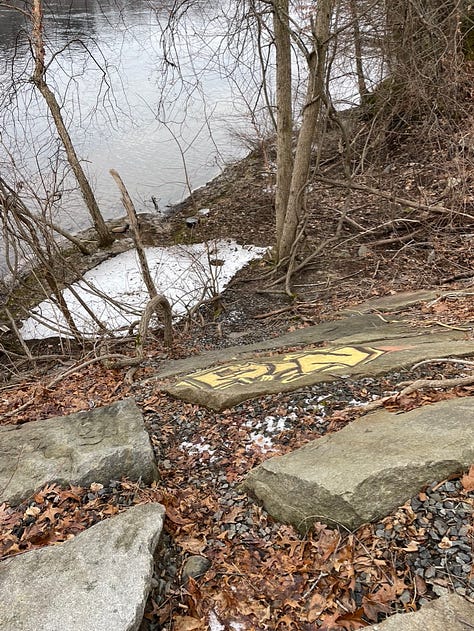

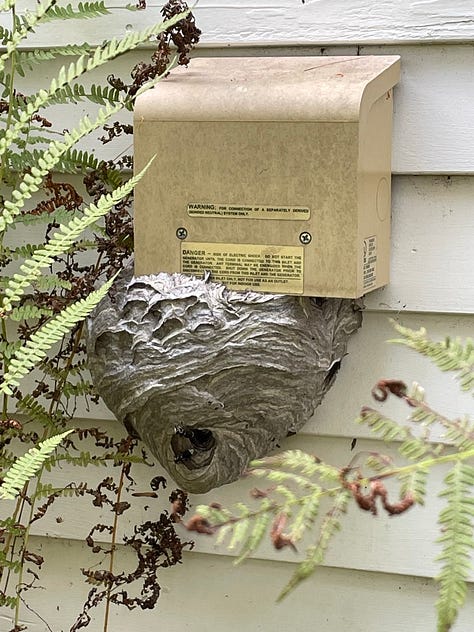
They remind me of a poem called Dead Water, by Wen Yiduo, and translated by Arthur Sze:
Here is a ditch of hopelessly dead
water.
A cool breeze would not raise the
slightest ripple on it.
You might throw in some scraps of
copper and rusty tins,
or dump in as well the remains of
your meal.
Perhaps the green on copper will
turn into emeralds,
or the rust on tin will sprout a few
peach blossoms.
Let grease weave a layer of fine
silk-gauze, and
mold steam out a few red-glowing
clouds.
Let the dead water ferment into a
ditch of green wine,
floating with pearls of white foam;
but the laughter of small pearls
turning into large pearls
is broken by spotted mosquitoes
stealing the wine.
Thus a ditch of hopelessly dead
water
can yet claim a bit of something
bright.
And if the frogs can't endure the
utter solitude,
let the dead water burst into song.
Here is a ditch of hopelessly dead
water.
Here beauty can never reside.
You might as well let ugliness come
and cultivate it,
and see what kind of world comes
out.I have an affinity for hopelessly dead water. I think it places few demands on anyone. People leave me alone when I am in waste spaces, because no one thinks to look there. In those places, I have the time to find out how I feel about things. When places are busy, or populated, or I have to interact with anyone else, I have to visit them twice—once in reality, when it’s much too much to take in or understand, and once in my mind, in the drifting. In the drifting, I go back alone, in my mind, and haunt the place, the people, the interaction, and figure out how I feel about it. I go visit my empty body in the past and bring my consciousness and soul this time. I feel a nostalgia for places and events that just happened because of this, because I can never be there in body, soul, and spirit all at the same time. I wish they could all go places together sometimes. The only places they can are the dead water places.
My students made ecospheres last week—collected water and muck and pondweed and set it up in sealed jars that we placed on the windowsill of the lab. We’ll test the water quality again when we open them up in a month or so. The mosquito larvae and diving beetles, and one elegant, olive-green leech have a fifth floor view clear across the 15 miles to the Boston skyline and the ocean beyond. The students talked about whether or not the creatures could perceive a shift—being up in the sky like this, or just that their pond-sized world had narrowed to a jar-sized one, and what their consciousnesses are like. I like to sit and look at the jar-ponds. At how, aside from the frenetic diving beetles, mostly the creatures move slowly, or just sit in the muck. I feel a sort of envy.
The human-created world is over-demanding on me, and I am baffled at how most people don’t routinely fall apart at what they are asked to do in the regular course of things. My commute overwhelms my system utterly—56 miles along the notorious metro-Boston highway system: cross-over merges, triple lane changes, all us Massholes careening around. My body makes the maneuvers, but my processing time lags and I feel like I’m driving blindfolded, so poor is my capacity to take in the events around me at such astonishing speed. I feel like a time traveler dropped in from 1780, trembling and clutching my head.
By the end of a teaching day, much as I love the work, I can feel my spirit hovering someplace alongside my body, or edging along the wall toward the door. I go back to my office to stare at a blank wall, because then I can watch the sparking lights that streak across my visual field like fireflies. They’re the mark of my overwhelmed neurology, like the circling stars and birds around a concussed cartoon character. I know they’re not a good sign, but they’re beautiful to watch. They fascinate me like the hallucinatory black forms that race in my peripheral vision and make me jump, they seem so real. I pay better attention to these things now, and try to heed their warning that my system is teetering on the edge of collapse and it’s time to sit by the dead water for a while until things stop spinning.
I’m working on a few things, trying to regulate myself and attend to how much energy things cost me, and make more deliberate decisions about what I am willing to spend it on. I am working on letting my face remain slack, and not trying to make eye contact and not to smile at everyone all the time. It all costs, and I can no longer afford to glad-hand it out like that. It’s a relief and a wonder every time I choose not to interact with someone, to keep a neutral expression, not nod along and hum encouragements. I’m grief-struck on top of all this, so my reserves are slim. I carry myself through each day from place to place without hope or dread, which is a mercy and a surprise. I have a feeling of being suspended at slack water, no movement in any direction, backward or forward. No plans, no ambition, but no self-recrimination either. Sometimes it feels so like liberation that I almost hear a narration in my head like the Buddhist stories of sudden awakening: “She looked at the leech and was enlightened.”




